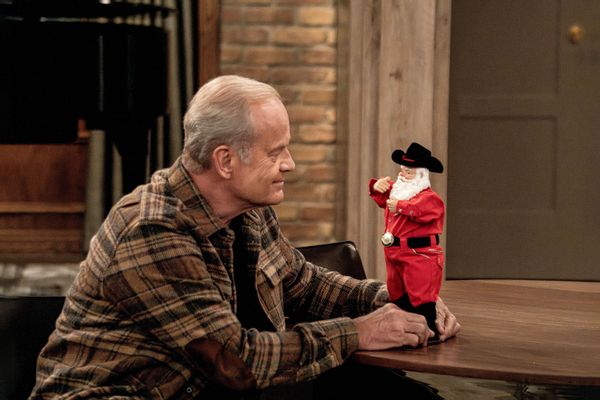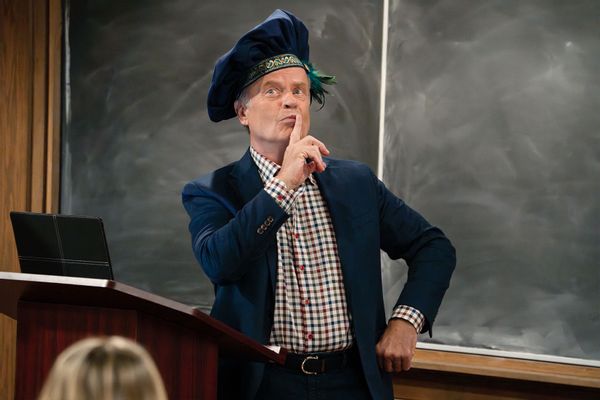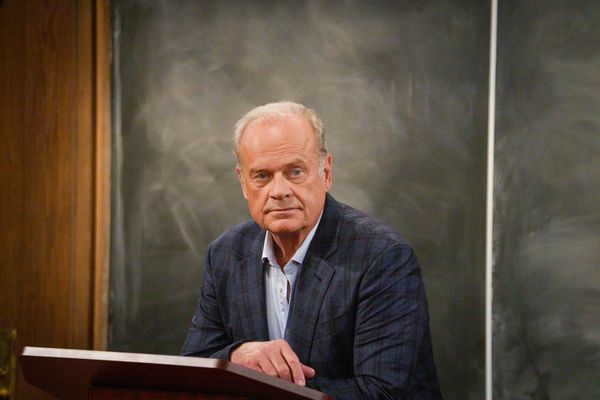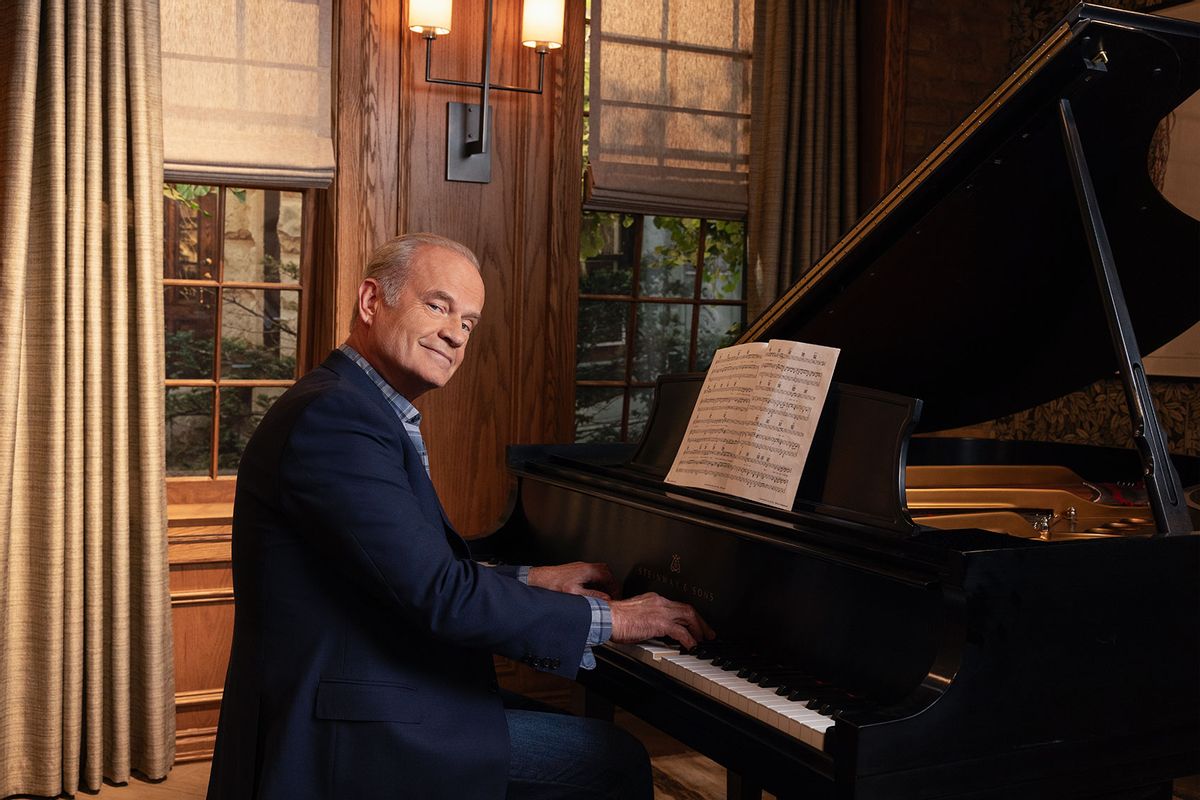Like any classic vehicle, it took a few episodes for the “Frasier” revival’s engine to warm up before its new parts acclimated, letting both the show and the audience relax into its familiar purr. Joe Cristalli and Chris Harris could have made the show more adventurous by placing Kelsey Grammer’s Dr. Frasier Crane in an entirely new situation, which might have been more rewarding.
By the season’s end, though, the showrunners’ choice to resume the classic’s form wins out, and no episode argues this as successfully as the recently streamed season finale “Reindeer Games.” The episode culminates in Frasier’s firefighter son Freddy (Jack Cutmore-Scott) bouncing between his father’s apartment and that of his friend Eve (Jess Salgueiro).
Frasier has willed a stiff overwrought Christmas party into existence overnight. Eve prefers to quietly tuck into a Hallmark movie marathon. They’re both needy and conveniently situated across the hall from each other, setting up prime conditions for French farce-style comedy choreography as Freddy nicks treats from his father’s bountiful gathering, then a few guests, until eventually one side of the hall is merrier than the other.
Classic “Frasier” antics are easy to replicate. Grounding comedy in a unifying sense of grief is a much taller order. This is Eve’s first Christmas without her husband and Frasier’s first in Boston and without his father Martin (the late John Mahoney). Freddy takes it upon himself to comfort each of them without acknowledging that he’s also mourning. Eve’s husband was Freddy’s closest friend. Martin was, of course, Freddy's grandfather.
 Kelsey Grammer in "Frasier" (Chris Haston/Paramount+)Such sentimental dichotomy is intrinsic to Frasier Crane’s lovability. He’s a pompous curmudgeon who comes from humble origins, a Harvard-educated celebrity psychologist whose father Martin was a cop baffled by how he ended up with a pair of effete sons who live for the opera. He exudes confidence but is thin-skinned; he’s highly sociable and profoundly lonely.
Kelsey Grammer in "Frasier" (Chris Haston/Paramount+)Such sentimental dichotomy is intrinsic to Frasier Crane’s lovability. He’s a pompous curmudgeon who comes from humble origins, a Harvard-educated celebrity psychologist whose father Martin was a cop baffled by how he ended up with a pair of effete sons who live for the opera. He exudes confidence but is thin-skinned; he’s highly sociable and profoundly lonely.
But these Boston episodes find a fresh purpose for Frasier by returning to the dynamics at play in his Seattle condo, with the economics in reverse. Freddy lives with Frasier, just as Martin did, but Frasier is determined to see to his grown son’s every need to make up for putting his career ahead of his family when Freddy was growing up. And Freddy, a blue-collar man like Martin, resists his generosity until, at last, the two learn to live together. Like father, like son . . . who must learn to like his father.
I hadn’t planned to revisit “Frasier” or review the finale, but doing so is vital to understanding why we’re drawn to it, and what it is telling the audience about the human condition.
Revisiting “Frasier” is vital to understanding why we’re drawn to it, and what it is telling the audience about the human condition.
“Frasier” is an intellectually stimulating comedy anyone can connect with, easy without being simplistic, comforting without gritting up our feelings with saccharine. A sitcom about family that trades poppets mugging for the cameras for digging into the universal conflict between generations, social class and modes of thinking.
That has not changed since “Frasier” first debuted in 1993. Neither has Kelsey Grammer’s politics. Grammer has always been an out-and-proud Republican, and like many white male conservatives of his generation – he’s 68 years old – his views have only slid rightward as the years wear on.
Early last week when BBC Radio 4’s Justin Webb asked Grammer if he was still supporting Donald Trump, it should not have been at all shocking when he said, “I am. And I’ll let that be the end of it.” According to CNN.com, after the interview Webb commented that Grammer would have been “perfectly happy to go on talking about it,” but the Paramount+ PR team nipped that in the bud.
That shutdown was inevitable. The reason is in a name: Roseanne Barr.
As an eternally curious person, I wish Grammer had been allowed to elaborate. That might provide a window to the minds of those whose politics are extremely at odds with their charismatic façade and public behavior.
Grammer’s admission generated headlines and ignited a minor uproar on social media, which is indicative of the public’s short-term memory, lack of history and above all, people’s unwillingness to search for answers on Google. It only takes a few clicks to find that in past election cycles, he’s endorsed Rudy Giuliani in the 2008 election primaries, Michele Bachmann in 2012, and Ben Carson in 2016 before throwing his support behind the Great Pumpkin.
That same year, when The Guardian asked Grammer, “Which living person do you most admire, and why?” he answered, “[Vladimir] Putin. Because he is so comfortably who he is.” Months before he dropped by “The Late Show with Stephen Colbert” to reminisce about waiting tables and scarfing down fudge sundaes before making the audience explode with laughter by admitting how different his tastes are these days: “My favorite snack is caviar,” he said.
There is a strain of person who views the world less in terms of Black and white than through a green lens.
Grammer has remained present onscreen since “Frasier” went off the air in 2004, adopting a "no small roles, only small actors" attitude toward his choices. Although an attempt to return in another TV comedy via ABC’s abysmal “Hank” flamed out quickly, he earned a Golden Globe for starring in “Boss” about a corrupt Chicago mayor (ah, that classic conservative bugbear!) struggling with a degenerative disease. Critics praised his performance, but few people watched, leading to Starz canceling the show after two seasons.
 Kelsey Grammer in "Frasier" (Chris Haston/Paramount+)Playing Frasier Crane made him incredibly rich. So has playing to the audience’s sensibilities. What may confuse people about his conservatism is the fact that Grammer has worn many hats, including executive producing shows like “Girlfriends,” which was created by a Black woman and headlined by a Black cast – including Tracee Ellis Ross. He was also a key E.P. behind “Medium,” and in 2010 co-starred in the very gay “La Cage aux Folles” on Broadway.
Kelsey Grammer in "Frasier" (Chris Haston/Paramount+)Playing Frasier Crane made him incredibly rich. So has playing to the audience’s sensibilities. What may confuse people about his conservatism is the fact that Grammer has worn many hats, including executive producing shows like “Girlfriends,” which was created by a Black woman and headlined by a Black cast – including Tracee Ellis Ross. He was also a key E.P. behind “Medium,” and in 2010 co-starred in the very gay “La Cage aux Folles” on Broadway.
There is a strain of person who views the world less in terms of Black and white than through a green lens. Having an estimated net worth of $80 million alters your perception of others, especially when you followed the Horatio Alger model of working your way up from nothing and, through a combination of luck and talent, landed one of the most iconic TV roles of the 20th century.
Grammer is also strategic. As open as he’s been about his right-wing politics, you’ll notice he hasn’t appeared on the Trump Train next to Scott Baio, Kid Rock or Antonio Sabato, Jr. – yet. If the actor were to spell out his reasons for supporting Trump now – even in the wake of his 91 indictments, fomenting an insurrection and declaring he’ll turn the U.S. into a dictatorship – Trump would celebrate Grammer’s endorsement on the campaign trail like he celebrated the “Roseanne” revival’s success.
No mainstream media company wants that kind of radioactivity attached to its lineup. And “Frasier” and its namesake characters are assets both Grammer and now Paramount have been careful to protect. The public can’t help seeing shades of the character in everything he does; what is Dr. Hank McCoy of “The X-Men” if not a mutant version of Harvard’s favorite guest lecturer?
 Kelsey Grammer in "Frasier" (Chris Haston/Paramount+)Divorcing a blue fur-covered superhero from the man voicing him is easier, largely thanks to CGI, than considering Grammer’s politics as separate from “Frasier.” Sitcoms like “Last Man Standing” and the 2018 version of “Roseanne” infused their partisan views of their stars into their storylines, although the partisan rhetoric that bled into Tim Allen’s show was purely ideological and mildly presented even then.
Kelsey Grammer in "Frasier" (Chris Haston/Paramount+)Divorcing a blue fur-covered superhero from the man voicing him is easier, largely thanks to CGI, than considering Grammer’s politics as separate from “Frasier.” Sitcoms like “Last Man Standing” and the 2018 version of “Roseanne” infused their partisan views of their stars into their storylines, although the partisan rhetoric that bled into Tim Allen’s show was purely ideological and mildly presented even then.
Want a daily wrap-up of all the news and commentary Salon has to offer? Subscribe to our morning newsletter, Crash Course.
The “Roseanne” revival attempted to do the same, but its fatal error was in having its main character share the same name and views as the woman who played her, who couldn’t refrain from dropping racist slurs on social media at the peak of her comeback’s success.
Grammer is neither mentally ill nor stupid. He mainly uses X, the platform once known as Twitter, to correct grammar — homophonically appropriate — and promote his work and other titles. More helpfully, his first name isn’t Frasier. That may not stop some from scanning the latest “Frasier” episodes for clues that it has been quietly seeping MAGA poison into our brains. To this I say: see for yourself.
People will view “Frasier” through whatever lens they choose; such is the nature of digesting art and culture. But that is why the show was a broadcast hit in the ‘90s and early Aughts when angry right-wing media was in ascendance and Fox News was but a Stage 1 cancer. “Frasier” gave that audience a sherry-swilling, opera-loving member of the elite to both laugh at and emulate. Everyone else watched the man they came to love on “Cheers” develop into a flawed gentleman somewhat humbled by life for whom we wished a happy ending.
Grammer’s dedication to Trumpism will inevitably ruin “Frasier” for some nevertheless. But skilled actors melt into their characters, convincingly wearing fictional souls on their skin. That makes the story a show tells more influential than the individual lending a body to a stage. Grammer’s politics have always been polarizing. “Frasier” won’t change that. By the same token, if the show if your quiet oasis of common ground in hectic times, its star should not be assigned the power to take that away from you.
All episodes of "Frasier" are streaming on Paramount+.
Read more
about this topic



Shares